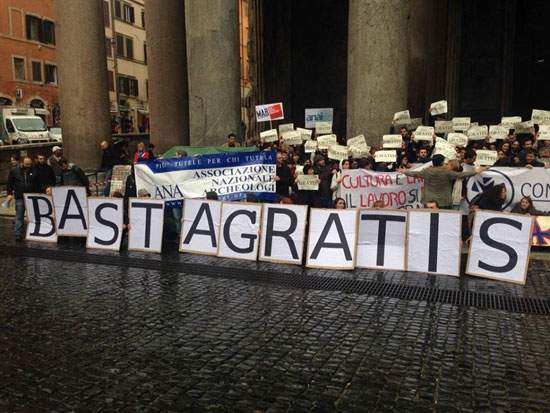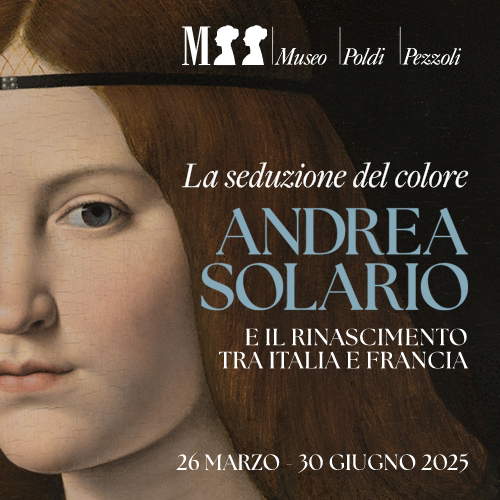Culture is work, and work pays: the National Association of Archaeologists to the mayor of Rome
We receive, and very gladly publish, a letter from Alessandro Garrisi, president of the Lazio section of theNational Association of Archaeologists to the mayor of Rome Ignazio Marino, in response to one from student Valentina Bellotti published last week in Finestre Sull’Arte. A fundamental concept emerges from this letter: culture is work, and work is paid for, with which we at Finestre Sull’Arte are in total agreement. We therefore agree with every single content of the letter, and we invite everyone, especially the younger ones, to read it, in order to understand what it means to work worthily and with dignity for culture. Happy reading!
Dear Mr. Mayor Ignazio Marino,
I am writing to you after reading the letter addressed to you by a young student of art history, Valentina Bortolotti, and I am writing to you not only in a personal capacity, but also on behalf of the professionals of the National Association of Archaeologists that I have the honor of representing in Lazio and Rome.
In fact, the young student, by approaching the discourse of the opening of museums starting from a topical affair involving the Zetema services company, has not done a good service either to herself or to the category of cultural heritage workers of which she will one day (one presumes) be a part.
The main misconception into which the young aspiring art historian falls is that museums can be kept open with the voluntary work of the most, precisely, willing. But a museum is not just made up of janitors who open a door in the morning and close it at night. And even if it were, that of the custodian is a delicate, guaranteeing, safeguarding role: too lightly today we tend to think that that role can be performed by volunteer staff. It is a disingenuous levity, which often actually conceals much more trivially lucrative aims on the part of those who are supposed to manage our city’s cultural heritage. How else can we judge the unworthy recent call (public notice) of the City of Rome to bring in volunteer associations in the custodial service of museums and archaeological areas that are not secondary, but exceptional jewels, such as the Napoleonic Museum, the Villa of Maxentius, and the Barracco Museum? A call for bids that discards from the budget of those who manage those sites a very specific cost item, that of custodial services.
Dear Mr. Mayor, cultural heritage workers also took to the streets in November, at the Pantheon and in other squares, to reiterate a simple concept: CULTURE IS WORK, AND WORK IS PAID FOR. Everything. Without uncertainty, without wavering, without remorse. Because until proven otherwise, this is still a country founded on work, not on volunteerism, much to the chagrin of all those who, from Parisi Presicce to Borletti Buitoni (by the way: but do these brilliant ideas always come to those with double surnames?) would welcome another future for our cultural heritage.
In a meeting with Councillor Marinelli and Superintendent Parisi Presicce a few days before the event, I personally left in their hands our alternative proposal for the management of cultural heritage. An alternative proposal both to the improper, almost brutal use of volunteers and to the Zetema model.
Oh yes, because this is how we can return to Zetema, from whose affair of these days the young student’s consideration started. You, Mr. Mayor, will know very well what Zetema is; you will know equally well by whom it is administered and how; and equally well, if you read your budgets you will see what amount of money each year the municipality disburses to clear its debts. Now, try multiplying that annual figure by 35 (the years that separate us from 2050: if you don’t know the reason for this date, ask those who administer Zetema), and hold on tight: that is the amount that between now and 2050 the City of Rome will pay for a company, Zetema, that operates in an economic sector outside the normal rules of the market, should its annual liabilities remain roughly similar to those of the last few years.
Should our proposal not have reached you through the hands of Councillor Marinelli, in which we left it, I am available for a new meeting in which we can discuss together our alternative proposals to volunteer and the Zetema model.
If I may finally address a plea to you, Mr. Mayor, it is to find time to meet with the young Valentina Bortolotti and explain to her that she is too young to sell out herself and her training by offering herself as a custodian at no cost. To explain to her that if today she agrees to work for free as a custodian, tomorrow she will find no place either as a custodian, a file clerk, or a curator, because when volunteer work is substituted for paid work, it becomes an unstoppable monster that engulfs everything in its path. To explain to you that in a country like Italy that could live off its cultural heritage, and particularly in a city like Rome that attracts tourists like flies to honey, if a museum is in danger of closing, the fault can only lie with those who run that museum, unable perhaps to understand the potential of the tool they have at their disposal. And if you want, Mr. Mayor, we will explain it together.
P.S. The National Association of Archaeologists is not against volunteerism, which it recognizes instead as a useful tool, under the proper conditions, for the management of particular aspects of the enhancement of our cultural heritage, but it is definitely against volunteerism replacing paid work.
Alessandro Garrisi
National Association of Archaeologists
President Lazio Section
 |
| November 30 demonstration against free labor, photo by National Association of Archaeologists |
Warning: the translation into English of the original Italian article was created using automatic tools. We undertake to review all articles, but we do not guarantee the total absence of inaccuracies in the translation due to the program. You can find the original by clicking on the ITA button. If you find any mistake,please contact us.



























